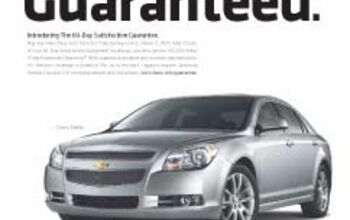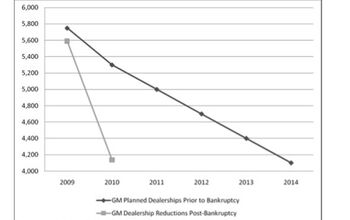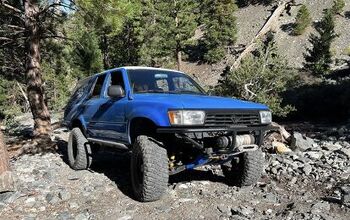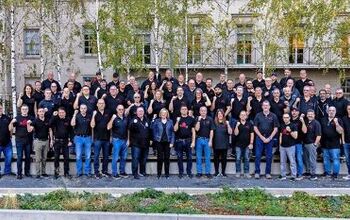Editorial: The Truth About Chrysler and GM Bankruptcy Fears
A recent NY Times op ed gave plaudits to a Senate investigation held in the 1930’s to discover the causes of the Great Depression. But the power of congressional investigators is vastly overstated and overrated. They can be stymied by resourceful, deep-pocketed corporations. Considering the current attitudes of US automakers, it’s unrealistic to expect any voluntary disclosure to Congress, any meaningful disclosure to taxpayers. But, as the Bermie Maddoff liquidation shows, bankruptcy court is another matter entirely. The trustee in the Madoff liquidation/investigation can ask the bankruptcy court to authorize subpoenas, which can be used to compel production of documents and to compel witnesses to testify. The prospect literally scares GM and Chrysler witless.
Both GM and Chrysler have much to hide. Have hidden much. GM has a long and ignoble history of overstating and restating its accounts, by billions of dollars. In 2006, GM revised profit figures for six years previous, and restated reported earnings for 2005. There are also no less than three ongoing SEC investigations into its dealings. All secret.
The company’s CEO and Chairman (former Chief Financial Officer) Rick Wagoner has been moving money around for a long time– selling assets, arranging deferred payments to the union, negotiating with creditors of their bankrupt former subsidiary Delphi, creating financial instruments with the automaker’s financial arm (GMAC), transferring cash from GM’s international subsidies and much, much more. Despite the fact that the U.S. government is now on the hook for $17.4b in loans, we, the taxpayer, have not seen GM’s books.
Cerberus, Chrysler’s private equity owner, and [still] the holder of a 49 percent share in the recently federally cash-infused GMAC ($6b), is also shrouded in secrecy. The Wall Street Journal recently unearthed the fact that Cerberus mortgaged Chrysler’s Auburn Hills HQ under its own name when it purchased Chrysler from Daimler. What else don’t we know? We don’t know how much rent Cerberus is charging Chrysler. We don’t know how much of Chrysler’s other assets Cerberus mortgaged to pay back private investors and/or raise capital. We don’t know what arrangements Cerberus made with GM re: GMAC.
When GM and Chrysler went to Congress to plead their case for federal loans, politicians demanded a look at the books. Both automakers withheld “commercially sensitive” information. In other words, they received their money without full disclosure. When discussing their situation in front of the cameras, both automakers used terms that sounded like accounting terms– with no accepted meaning in accounting parlance. At the same time, GM and Chrysler deployed public relations groups to plant incomplete and misleading news articles, issue biased press releases, and draft op ed pieces that fooled main street media and confused any real disclosure.
A Chapter 11 filing is a process of legal discovery. In a Chapter 11 case, the court forms an official committee/committees of creditors. Any official committee can ask the bankruptcy court to issue subpoenas relating to the company’s acts, conduct, property, liabilities and financial condition.
The subpoenas can compel company officers– and others– to produce documents. They can also force witnesses to testify under oath. Committees can use their investigative powers to try to find assets to pay creditors. For example, if the bankruptcy court could establish the exact financial relationship between GM NA and its foreign subsidiaries. By the same token, if GM made preferential payments to some creditors, the committee could reveal this fact.
Committees also investigate transactions between a debtor company and its officers, directors and shareholders, seeking to determine if any improper transfers were made. If Cerberus leveraged Chrysler cash or assets to benefit Cerberus’ investors/shareholders and/or assumed debt that left Chrysler without sufficient operating capital, these facts will come out.
While the public has a right to know where it’s money went, there are limits to what a bankruptcy investigation can expose. A creditors committee’s findings won’t become a public document. Investigatory depositions of company officers and directors are not open to the public. The committee is interested in getting the highest possible recovery for the group it represents, not a general disclosure of what went wrong and why.
That said, if criminal or illegal activities are exposed, the bankruptcy judge would refer the case to a criminal prosecutor. And leaks to the press are not uncommon. All of which means if GM or Chrysler were to file for C11, both companies would face intense scrutiny of their business dealings.
Meanwhile, the absence of information about the current financial condition of GM or Chrysler and the detailed terms of Treasury loans to automakers is deeply troublesome. Our new president has stated his commitment to a “higher standard of accountability and transparency.” It remains to be seen if he will do anything to require adequate disclosure by recipients of federal loans, or whether it will be business as usual.
Either way, if and when federal bankruptcy court get involved with Chrysler, GM and/or Ford, it’s hardly likely that their management teams would emerge unscathed. In a battle between fear and greed, fear wins.
More by Richard N. Tilton
Latest Car Reviews
Read moreLatest Product Reviews
Read moreRecent Comments
- Arthur Dailey The longest we have ever kept a car was 13 years for a Kia Rondo. Only ever had to perform routine 'wear and tear' maintenance. Brake jobs, tire replacements, fluids replacements (per mfg specs), battery replacement, etc. All in all it was an entirely positive ownership experience. The worst ownership experiences from oldest to newest were Ford, Chrysler and Hyundai.Neutral regarding GM, Honda, Nissan (two good, one not so good) and VW (3 good and 1 terrible). Experiences with other manufacturers were all too short to objectively comment on.
- MaintenanceCosts Two-speed transfer case and lockable differentials are essential for getting over the curb in Beverly Hills to park on the sidewalk.
- MaintenanceCosts I don't think any other OEM is dumb enough to market the system as "Full Self-Driving," and if it's presented as a competitor to SuperCruise or the like it's OK.
- Oberkanone Tesla license their skateboard platforms to other manufacturers. Great. Better yet, Tesla manufacture and sell the platforms and auto manufacturers manufacture the body and interiors. Fantastic.
- ToolGuy As of right now, Tesla is convinced that their old approach to FSD doesn't work, and that their new approach to FSD will work. I ain't saying I agree or disagree, just telling you where they are.


































Comments
Join the conversation
Maybe after C11 we'll know who really put Tucker out of business. But really what we will find is how pathetically these companies have been run, it will be a disgrace.